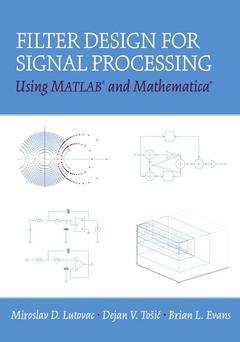Description
Filter design for signal processing using matlab and mathematica
Authors: LUTOVAC Miroslav, TOSIC Dejan, EVANS Brian
Language: English
Approximative price 123.50 €
Subject to availability at the publisher.
Add to cart
Publication date: 09-2000
756 p. · 18.5x24 cm · Hardback
756 p. · 18.5x24 cm · Hardback
Description
/li>Contents
/li>Comment
/li>
- This text opens up completely new vistas in basic analog and digital IIR filter design - regardless of the technology. By introducing exceptionally elegant and creative mathematical stratagems (e.g., accurate replacement of Jacobi elliptic functions by functions comprising polynomials, square roots, and logarithms), optimization routines carried out with symbolic analysis by Mathematica, and the advanced filter design software of MATLAB, it shows students how to design many types of filters that cannot be designed using conventional techniques. The filter design algorithms can be directly programmed in any language or environment such as Visual BASIC, Visual C, Maple, DERIVE, or MathCAD.
1. Signals.
2. Systems.
3. Transforms.
4. Classic Analog Filter Design.
5. Advanced Analog Filter Design Case Studies.
6. Advanced Analog Filter Design Algorithms.
7. Multicriteria Optimization of Analog Filter Designs.
8. Classic Digital Filter Design.
9. Advanced Digital Filter Design Case Studies.
10. Advanced Digital Filter Design Algorithms.
11. Multicriteria Optimization of Digital Filter Designs.
12. Elliptic Functions.
13. Elliptic Rational Function.
Bibliography.
Index.
Example Mathematica Notebooks.
2. Systems.
3. Transforms.
4. Classic Analog Filter Design.
5. Advanced Analog Filter Design Case Studies.
6. Advanced Analog Filter Design Algorithms.
7. Multicriteria Optimization of Analog Filter Designs.
8. Classic Digital Filter Design.
9. Advanced Digital Filter Design Case Studies.
10. Advanced Digital Filter Design Algorithms.
11. Multicriteria Optimization of Digital Filter Designs.
12. Elliptic Functions.
13. Elliptic Rational Function.
Bibliography.
Index.
Example Mathematica Notebooks.
- A cutting-edge bridge between filter theory and practice - Presents new algorithms and designs developed over the last five years, and includes ready-to-use filter design algorithms and implementations of the algorithms in both MATLAB and Mathematica.
- A unique, new approach to analog and digital filter design - Develops alternative techniques and software to return a comprehensive set of designs that meet a specification and represent the infinite design space. Includes filters that have minimal order, minimal quality factors, minimal complexity, minimal sensitivity to pole-zero locations, minimal deviation from a specified group delay, approximate linear phase, and minimized peak overshoot. For digital filters, the design space also includes filters with powe
© 2024 LAVOISIER S.A.S.
These books may interest you

Analog Filters using MATLAB 73.93 €



